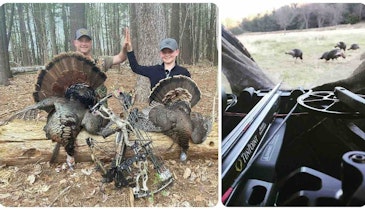By BRIAN BROOM | The Clarion-Ledger
JACKSON, Miss. (AP) —While 2014 saw many changes, such as baiting hogs, safety orange regulations, primitive weapons and daily bag limits for antlerless deer, 2015 may be the year of no change. And that's not entirely bad.
One topic that has had Internet chat sites buzzing with speculation is the possible closure of three wildlife management areas in Mississippi.
Sky Lake, Muscadine Farms and Lake George WMAs are located in the Delta and all are popular hunting grounds. Although they are managed by the Mississippi Department of Wildlife, Fisheries and Parks, they are owned by the U.S. Army Corps of Engineers.
“The agreement was that they would be funded 100 percent for us to manage them,” Chad Dacus, MDWFP Wildlife Bureau Director, said. “They pay for all activities on those properties.”
The arrangement has worked well and allowed hunters to enjoy a total of roughly 15,000 acres of prime habitat, but federal funding cuts could take their toll this year. Dacus said if funding from the Corps of Engineers ceases, MDWFP will no longer be able to manage those areas.
Even if the expected funding cut takes place, it does not necessarily mean the gates will be closed to hunters.
“We're trying to find any non-federal entities we can to help keep these places open,” Greg Raimonda, USACE Vicksburg District Chief of Public Affairs, said.
Raimondo said USACE has been in discussions with various government agencies and nonprofit groups in an attempt to devise a plan that would keep the properties available to the public.
“We're just doing all we can to keep the places open,” Raimondo said. “That's our focus.”
State Rep. Scott Bounds, R-Philadelphia, chairman of the state House Wildlife Committee, said he's been aware of the issue for some time and has been talking with members of Mississippi's congressional delegation about it. While Bounds didn't go into detail about the talks, Bounds thinks closure of the WMAs will be averted.
“I feel very confident we can turn that around so we don't close them,” Bounds said. “Here again, I want to emphasize I don't have an inside track, I don't have a crystal ball.
“I just feel very confident they are going to remain open.”
Whenever there are discussions about MDWFP, many of them involve funding, but it's unlikely the department will see an increase in 2015.
Dacus said almost all funding is generated through the sales of hunting and fishing licenses.
Those sales provide income in two ways. Ed Penney, MDWFP Director of Conservation Programs, said federal excise taxes on hunting and fishing gear are divided among the 50 state game and fish departments, according to population and numbers of licenses sold.
The sale of the licenses themselves is also a major source of revenue for the department, but the prices for Mississippi residents have not been increased in 22 years.
While alligator hunting fees, commercial paddlefish permits and WMA user fees have become additional sources of revenue during that 22-year period, Mississippians still pay substantially lower fees for hunting and fishing licenses when compared to most surrounding states.
A resident Sportsman's License costs $32 and allows the purchaser to hunt deer, turkey, small game and fish freshwater. It also includes archery and primitive weapon hunting. Similar licensing in Tennessee costs $112 and $59.50 in Louisiana.
“We're one of the top 10 deer states in the country, top 10 to 15 turkey states and top 15 to 20 in duck hunting, but we're on the lower end of license fees for residents,” Penney said.
And it appears the license fees will remain there, for now, possibly due to the political cycle. Any resident license fee increases must be passed by the Legislature, and there is a general election in November. Historically, election years aren't popular times for the passage of tax increases, or in this case, user fee increases.
“I don't see us considering a license fee increase this year,” Bounds said. “In a new term of the legislature in 2016, I think there will be some things on the table that needed to be addressed for several, several years.
“I think it's something that needs exploring.”
___
Information from: The Clarion-Ledger, http://www.clarionledger.com






